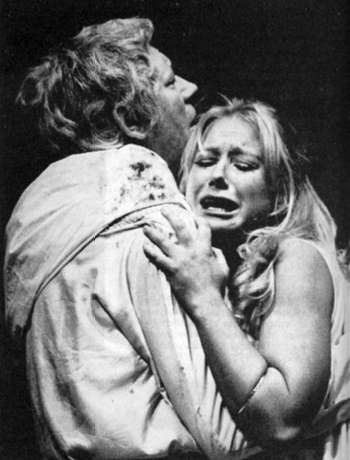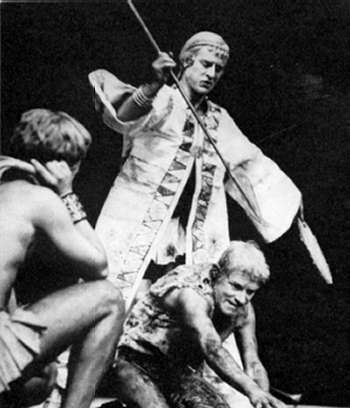Troilus and Cressida
(Stratford upon Avon)
Achilles 's fatal flaw
|
A few months ago Michael Meyer's The
Ortolan was published by Hart-Davis, several years after its first
production by the OUDS at the Marston Hall. It was written by Mr Meyer some
time before he acquired his formidable reputation as a translator of Ibsen and
Strindberg, and his characters explain themselves with remarkable lucidity. It
is a tragedy of the suffering caused by vicarious creativity; but another point
has made it this week of special interest. It has been produced twice, at
Oxford and then in Manchester; and on each occasion the least important part in
the play was taken by an actress who at the time was completely unknown to the
big theatre-going public, but who later became famous. In 1954 the actress was
Margaret (now Maggie) Smith; and in 1966 she was Helen Mirren, who in the
following year achieved celebrity in Alls Well that Ends Well, and is
now the heroine of John Barton's production of Troilus and Cressida
(Royal Shakespeare Company, Stratford-on-Avon).
It would be pleasant to say that Miss Mirren
has actually increased her celebrity this week; but Mr Barton's production,
which presses upon the very limits of provocation, gives her no chance to do
so. |
 |
It is hardly too much to say that Mr Barton sees this
most disputed of Shakespeare's tragedies, not as Troilus and Cressida,
but as Achilles and Perversion. There are times when the performance
appears to be on the point of developing into a homosexual orgy in the midst of
which poor Cressida's physical allure and moral delinquency seem a tedious
interruption of the main sensational business of the evening, which is to show
Achilles as a startling kind of male whore.
Alan Howard, so good so often as a proud,
epigrammatic, unfeeling young aristocrat, plays Achilles as if he were a female
impersonator. Achilles's hair is artificially golden, and done up in a bun at
the back; he has a coquettish smile, and wears a woman's wrapper, which at one
point he flings wide open to display coyley to Hector the beauties of his
person. In the midnight-party scene, in as daring a gesture as I expect to see
even after the censorship is abolished, he lies prostrate on his couch, and
seems to invite the hideous Thersites to sexual intercourse. The big perverse
moment of the play is not - as I have always seen it - that in which Cressida,
after being torn from the arms of Troilus, encourages all the Grecian generals
to kiss her in turn. It is rather the enormous cry of rage and pain with which
Achilles greets the suggestion that it is conceivable that he might love a
woman. Mr Howard's performance is very remarkable; it becomes the glittering
centre of the play; some people may find it distasteful.
|
I have no doubt that Mr Barton has plenty of
textual justification for his treatment of Troilus and Cressida.
Whatever Achilles may have been in Homer, in Shakespeare he was effeminate.
That Mr Barton makes this effeminacy revolting is not to be cavilled at,
either. The temper of the play shows that Shakespeare wrote it in a mood of
irrational disgust with sex, which he therefore made as unpleasant as possible.
Mr Barton comes upon his goal by a relatively unfrequented path, ignoring
broader and more attractive thoroughfares; but it would be disingenuous to
maintain that it is very far from the goal that Shakespeare intended.
In fact, it may be that it is because it so
precisely and powerfully achieves at least part of Shakespeare's aim that I
dislike this production so much. Its wine is very bitter. I would much rather,
for pleasure's sake, have had a full exploitation of Miss Mirren's enticing
charms, and a Troilus who put one less in mind of a gushing, grinning,
underprivileged product of an Asia Minor Comprehensive . I would have had the
great jewels of poetry polished instead of clouded. I do not wish to learn
Shakespeare's lesson as it is taught here. I am forced to conclude that I am
not at the moment ready for the full impact of this Troilus and Cressida. |
 |
Harold Hobson
Sunday Times, 11.8.68.

